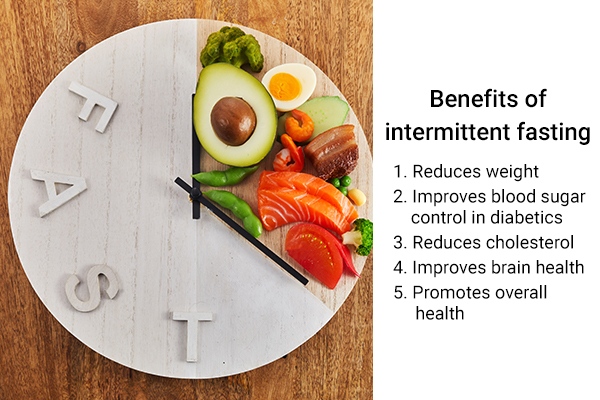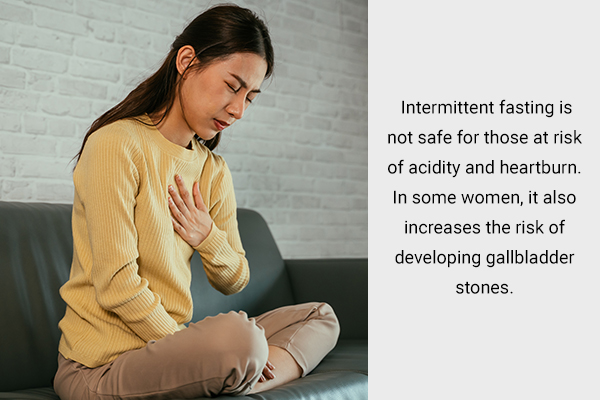In this article:
If you are passionate about health and keep tabs on the current trends of weight management, chances are you may have come across intermittent fasting (IF). People who follow this pattern of eating report benefits such as weight loss and boosted energy.

IF is the diet pattern where you limit your eating window to a few hours within the day. People who follow this usually fast for 12–16 hours and eat for the remaining 8–12 hours. This eating pattern usually limits caloric consumption and results in some weight loss. (1)
Since the eating window falls during the day, most people include their fasting window during their hours of sleep. This means your nightly 7–8 hours of sleep does count as fast!
So yes, sleep count as fast.
How Are Sleep and Intermittent Fasting Related?
Any prolonged period of not eating can be considered a fasting period. In fact, the word breakfast itself comes from “breaking the fast” you were in during your period of sleep.
During sleep, you naturally do not consume food, and this time can be included in the fasting window if you are practicing intermittent fasting (IF). Upon waking, you can avoid eating for a few hours to complete your fasting hours.
In fact, including sleep in your fasting window also allows you to sync your mealtimes with your body’s circadian rhythm to optimize metabolic function. (2)
However, regardless of whether you practice intermittent fasting or not, sleep is considered a fasting period as you are not eating during this time.
How Does Intermittent Fasting Work While Sleeping?
Intermittent fasting is mainly followed in three main patterns: 12/12, 16/8, 20/4, where you fast for 12, 16, or 20 hours, followed by eating windows of 12, 8, or 4 hours, respectively.
The idea behind IF is that, by avoiding solid foods that provide calories, the body can tap into the reserved fat for fuel, resulting in fat reduction. This natural reduction combined with a reduced caloric intake due to a limited eating window can further benefit a weight loss regimen. (2)
It is important to note that if you consume high-fat or high-sugar foods during your eating window during IF, you will not have any weight loss due to the high amount of calories consumed.
Moreover, IF has been found to strengthen the peripheral circadian rhythm or sleep cycle as it limits food intake during late evening and late night. This signals the body that it is time to sleep and is helpful for those experiencing erratic sleep cycles.
The additional weight reduction experienced can also be beneficial in improving sleep as it can reduce the risk of conditions such as obstructive sleep apnea. (3)
Benefits of Intermittent Fasting

Practicing intermittent fasting can offer the following benefits.
1. Reduces weight
One of the most widely studied effects of IF is its result on weight. Multiple trials have found that IF resulted in weight loss ranging from 0.8% to 13% of starting weight. (1)
IF has also been particularly beneficial for reducing fat mass, especially around the belly, (4) although more research is needed on this topic.
2. Improves blood sugar control in diabetics
Another noticeable benefit of IF is its ability to influence and effectively reduce fasting blood sugar levels. Research has also identified its role in reducing insulin resistance, which is a great nonmedical management technique for type 2 diabetes. (4)
Since most studies were done with the involvement of a physician, it is important to consult a doctor before beginning any diet plan.
3. Reduces cholesterol
Along with weight control, outcomes of heart health can also be improved with IF. One major way it can do so is by reducing cholesterol levels in the blood.
High cholesterol levels can raise the risk of developing heart disease by the formation of fatty plaques within the blood vessels. The fatty plaques restrict blood flow and may cause strokes. (5)
In a study where participants fasted for 12 hours three times a week for 6 weeks, there was a significant elevation of HDL (good cholesterol), which can directly reduce the risk of heart diseases. (5)(6)
4. Improves brain health
Recent clinical studies have found IF to have beneficial effects on outcomes of degenerative brain diseases such as Alzheimer’s disease, epilepsy, and multiple sclerosis. (7)
During the process of fasting, the body switches from using glucose to using fats as the preferred energy source. This leads to certain changes in the cellular function, which trigger repairs. During this repair, the body gets rid of improper and damaged neurons to keep the brain healthy. (7)
It is also pertinent to note that more research and larger studies are underway to identify and further establish conclusive results.
5. Promotes overall health
Fasting, in general, is healthy for the body as it stimulates the production of new cells. IF has also been recognized to have some antiaging potential.
Many recent studies have found IF to reduce overall health and oxidative stress in the body, as discussed above. This may lead to improvement in lifespan, which is evident in animal studies. (8)
However, experts also warn against frequent and prolonged IF as it has been found to increase all-cause mortality in the US population. (8)
For this reason, it is suggested to stick to a 12-hour fasting window and practice IF for a short duration only.
Is Intermittent Fasting Safe?

Though it may seem tempting to practice IF when you see other people gain results, careful consideration must be taken before incorporating any new eating habit.
Though deemed generally safe, IF is not for:
- Those at risk of acidity and heartburn as IF is likely to increase the chances of their development. In some women, it also increases the risk of developing gallbladder stones. (8)
- Pregnant and breastfeeding women, adolescents, children, and the elderly (9)
- People at risk of developing or recovering from eating disorders, which need to be addressed with utmost care
- People with hypothyroidism or Hashimoto’s disease, wherein their thyroid hormone is low (10)
Why Is It So Hard to Sleep When You’re Doing an Extended Fasting?
Prolonged periods of fasting (over 12 hours for more than 1 week) can result in increased levels of cortisol or stress hormone. (11) Since cortisol is also responsible for increasing daytime wakefulness, an increase in its amount in the body will reduce the levels of melatonin or sleep hormone. (12)
Therefore, many people who fast for long durations for weeks report difficulty in sleeping.
Practical Takeaways
- Fasting that involves refraining from eating for a certain amount of time followed by a period of eating is called intermittent fasting.
- The fasting window usually includes overnight sleep of 7-8 hours, making sleep count as part of fasting.
- IF has several health benefits such as reducing weight, improving insulin sensitivity, improving good cholesterol levels, reducing the risk of heart diseases, and improving brain function.
- IF needs to be practiced carefully and under your doctor’s supervision.
- People who should not do IF include pregnant and lactating women, those at risk of eating disorders, the elderly, children, and those with a low-functioning thyroid.
- Was this article helpful?
- YES, THANKS!NOT REALLY


